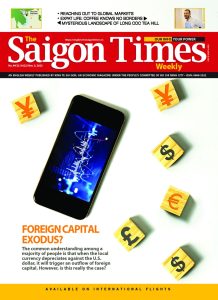The bond market has continued deteriorating since leaders of Tan Hoang Minh Group and Van Thinh Phat Holdings Group Corporation were detained
Bond issues plunge
Attention has centered on the corporate bond market lately as buyers were concerned over the liquidity of the bonds they bought. Meanwhile, the market is experiencing changes as Decree 65/2022 tightened control over bond sales, forcing debt-issuing organizations to limit their sales and buy back their bonds to reduce debt repayment pressure and avoid legal risks.
New corporate bond issues have ebbed steadily since July. Just VND6.1 trillion worth of corporate debt was issued in September, down 18.27% over August and 76.44% year-on-year.
Banks continued to be the biggest bond sellers, with 22 bond issues worth VND10.2 trillion, accounting for 63% of bonds sold in the market. Of the issues, the bond lot with the highest value belonged to the Vietnam Joint Stock Commercial Bank for Industry and Trade, at VND3 trillion.
Still, their sales volume fell by 40.2% compared to the previous month.
Fundamentally, the plunge resulted from banks’ mobilization of enough medium- and long-term capital as required by Circular 08/2020/TT-NHNN, which came into effect on October 1. Meanwhile, real estate bonds have yet to improve. September saw only two issues: one by Nova Thao Dien Company Limited, at VND2,300 billion, and the other by Son Kim Land Corporation, worth VND500 billion. Though the issue value increased over August, real estate bonds still stagnated.
Wise move
According to FiinGroup, the outstanding value of corporate bonds by the end of September topped VND1,300 trillion, down VND200 trillion over late 2021. Of the total, over VND400 trillion worth of bonds were issued by banks, and the remaining included real estate bonds worth VND455 trillion and bonds issued by non-banking financial companies. The figures seemed huge, but they only accounted for a mere 4% of the total outstanding debts of Vietnam’s banking system. In China, the outstanding value of corporate bonds amounted to US$8 trillion, accounting for 44% of the country’s gross domestic product (GDP).

However, it still succeeded in handling the debts after two turbulent years, while the figures in Vietnam only made up 15% of the country’s GDP in late 2021.
From a macroeconomic outlook, bonds are a critical channel for companies to raise funds in the medium and long term. It helps them rely less on bank loans, reducing commercial banks’ burden on providing funds. With that in mind, the Government has taken necessary action to ensure the corporate bond market’s sustainable development, such as tightening control over bond sales and improving transparency in the market.
The past few years have proven that bonds were more attractive than bank savings. A three- to four-percentage-point difference in coupons had helped the market reach VND1,500 trillion by the end of 2021. Before the corporate bond fraud scandals involving Tan Hoang Minh and Van Thinh Phat occurred, investors had paid little attention to issuers’ reliability or collateral assets for bonds, as most of them had placed their trust in consultants and debt-issuing organizations, and they had been lured by high coupons. However, the cases of Tan Hoang Minh Group and Van Thinh Phat Holdings Group Corporation have undermined their confidence.
Basically, corporate bonds include two types: secured and unsecured bonds. According to experts, bond buyers should choose debts issued by reliable and big companies if they buy unsecured bonds. Besides, buyers should look at the original purpose of using the proceeds from bond sales. For secured bonds, experts advised that investors should pick up highly liquid bonds or bonds secured by liquid assets such as valuable papers or certificates of deposit. The past few years showed that it took time and effort to handle poorly liquid bonds or debts secured by properties and equipment once debt-issuing organizations declared insolvency, as selling such collateral required much time.
On that basis, FiinGroup proposed keeping a clear-headed analysis of widespread information to avoid selling out bonds without knowing issuers’ financial status. In addition, investors should negotiate with bond sellers via intermediates if the debt-issuing organizations fail to pay principal or interest.











